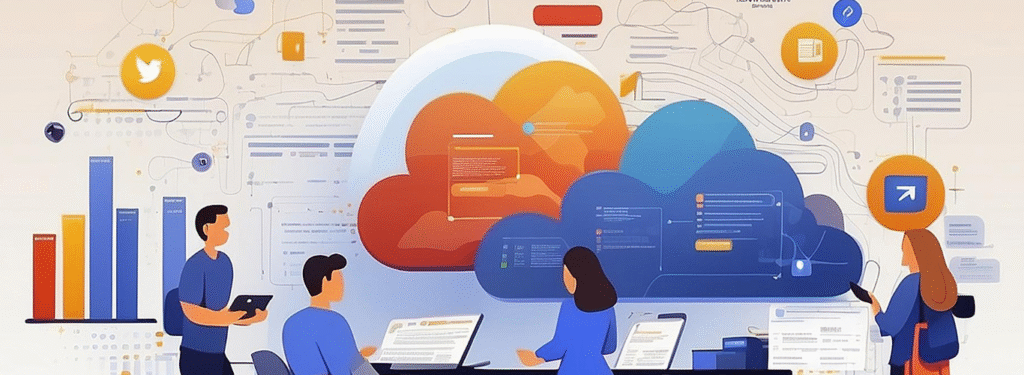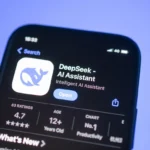Over the years, cloud management platforms have been playing a vital role in different sizes of businesses. From reducing cost to building scalability and collaboration, cloud management systems do everything for our business needs.
But as we step down into 2025, the integration of AI (Artificial Intelligence) in cloud management systems has revolutionized the whole of business management platforms. Top AI cloud business management platform tools like Google Cloud AI, Microsoft Dynamics 365 AI, and Zoho One allow businesses to foster their operations, analyze a huge amount of data in no time and enhance flexibility and decision-making.
Overall, these tools are ensuring that you just don’t flow with the competition but set your own path to the next-generation hybrid. Top AI-Driven Cloud Business Management Solutions may include:
| Platform | Best For | Strength |
| Google Cloud AI | DATA-DRIVEN Enterprises | Advanced Analytics, ML Tools |
| Zoho One | SMBs needing all-in-one tools | Affordable, easy to use |
| Microsoft Dynamics 365 AI | Businesses that require all-in-one systems | Strong ERP + CRM + AI |
| Salesforce Einstein | CRM-focused businesses | AI for sales & marketing on autopilot |
| monday.com Work OS | Collaborative teams | Workflow automation, visual dashboards, etc. |
Why Need Top AI Cloud Business Management Platform Tools?
AI cloud business management platforms help bring automation and streamlining to the end-to-end core business operations including sales, finance, HR functions, supply chain and project management — with the power of the new-age artificial intelligence and cloud computing. These help organizations make better decisions by analyzing information in real time, predicting outcomes, and providing actionable insights.
However, these can range from AI-based predictions, workflow automation and virtual assistants to smart analytics dashboards and natural language processing. Therefore, being cloud based makes it easy for teams to collaborate from anywhere, scale quickly, and have their data secure and compliant.
From automating payroll to managing inventory, improving customer interaction or making reports, these platforms minimize manual labor and maximize efficiency. Now, in 2025, they are critical for companies that want to maintain agility and remain competitive in an evolving digital space.
Exploring Top AI Cloud Business Management Platform Tools

Salesforce’s Einstein 2.0
Best for: CRM, Sales Automation, Customer Engagement
Salesforce’s upgraded Einstein 2.0 AI engine, continues to dominate the CRM space. The cloud-native platform now includes advanced predictive forecasting, natural language search, and AI-generated lead scoring. Unlike Einstein 1.0, this upgraded version offers more enhanced features that help businesses to achieve deeper insights into customer behavior, engagement, and preferences.
Key Features:
- AIPT: AI-generated customer insights & recommendations
- Real-time Sales Pipeline Optimization
- Voice-enabled virtual assistant for agents
- Dashboard with auto-generated reports & performance summaries
Why it stands out:
From its natural integration with Slack to its real-time collaboration tools, it gives hybrid and remote sales teams a competitive edge.
Oracle Fusion Cloud with AI Co-Pilot
Best for: Finance, HR and supply chain
Oracle’s Fusion Cloud suite is now embedded with a powerful AI Co-Pilot to automate tasks such as invoice matching, payroll auditing, and demand forecasting.
Key Features:
- HR & finance queries conversational AI assistant
- Intelligent expense and procurement tracking
- Intelligent adaptation in the hiring process
- Real-time alerts for end-to-end supply chain planning
Why it stands out:
Instead, it can learn about the company-specific patterns, thus offering insights that are contextual with recommendations.
Google Cloud
Best for: Organizations that would benefit from scalable, cloud-native infrastructure that offers advanced machine learning and analytics.
Google Cloud Platform (GCP) also has services available in the cloud that runs on the same infrastructure that Google uses internally for products such as Google Search and YouTube. It is a suitable and efficient Big Data and machine learning library for HPC systems.
Key features:
- BigQuery for server less analyzers of data
- AI and machine learning products such as Vertex AI
- Cloud Storage with redundancy in multiple regions
- Auto-scaling Kubernetes with GKE (Google Kubernetes Engine)
- Security and identity management
- Native integration with Google Workspace
Why it stands out:
Google Cloud is strong in big data and AI/ML. BigQuery ’s real-time analytics and cost-effective querying is changing the way companies store and analyze data.
Microsoft Dynamics 365 Copilot
Best for: Cross-Departmental Enterprise Management
Another top ai cloud business management platform tools is Microsoft’s Dynamic 365 Copilot solution. This tool is now a go-to option for enterprises seeking an integrated platform backed by Azure’s powerful AI infrastructure.
Key Features:
- Marketing, Sales, Finance and Customer Service powered by AI derived insights
- Integration with Microsoft 365 and Teams
- Predictive customer behavior modeling
- Automate workflows using the Power Platform
Why it stands out:
Its native ecosystem empowers users to navigate from data to action within a single unified interface — critically beneficial for enterprises running on Microsoft.
Zoho One AI
Best for: Small to mid-sized businesses (SMBs)
Zoho One is an enterprise budget powerhouse, from project management to finance and HR. It allows businesses to gain more customers, manage employees, handle their operations and finances on a single system. Therefore, this AI assistant is now embedded in all 45+ applications from Zoho and 1000+ interoperable integrations.
Key Features:
- AI chat & voice assistant for all modules
- Business anomaly detection
- Sales & inventory forecasting tools
- Smart analytics dashboards
Why it stands out:
Its affordability, maximum scalability, and customizability make it perfect for growing businesses with varying needs.
SAP Business Technology Platform (BTP) AI Edition
Best for: Large organizations with complicated workflows
In 2025, SAP’s BTP offers AI Core, enabling organizations to integrate intelligence seamlessly into their ERP processes with minimal coding.
Key Features:
- Domain specific AI Models for manufacturing, retail etc.
- Smart robotic process automation (RPA)
- Real-time scenario planning
- It aims to build the ‘prescriptive analytics’ capability into predictive maintenance and asset management
Why it stands out:
With its advanced AI capabilities and deep industry expertise, SAP is of tremendous value to organizations looking to modernize their legacy systems.
Monday.com Work OS with AI
Best for: Project and Operations Management
Monday. com Work OS now includes an AI-powered automation builder and forecasting engine that helps teams do smarter project management.
Key Features:
- Project timelines & risk analysis generated by AI
- Smart automation recipes
- Support for Natural Language Queries
- Integrates with over 200 apps
Why it stands out:
Its visual interface coupled with AI-powered workflows serves the needs of non-technical users and project managers.
Notion AI for Business
Best for: Knowledge Management & Internal Collaboration
Notion is no longer just a note-taking app. By 2025, its AI has become a significant business tool, assisting teams with documentation, onboarding and project flows.
Key Features:
- AI knowledge base generation
- Summary & document generation in one click
- Intelligent tagging and workflow recommendations
- Databases and content that auto-update
Why it stands out:
Notion’s versatility, coupled with AI guidance, is why it’s become a darling of many startups and content-driven teams.
Cloudera
Best for: Businesses in need of hybrid or on-premise big data products that are open-source compatible.
The Cloudera hybrid data platform enables businesses to build and deploy the application once, and have it run smoothly wherever it makes sense ― on premise, in the cloud or both. It is based on Hadoop and other popular open-source projects for on-premises or cloud deployment.
Key features:
- Hybrid and multi-cloud functionalities
- Support of Apache Hadoop, Spark, and Hive
- Secure lineage and governance of data
- unified data management with Cloudera Data Platform (CDP)
- streaming, and batch processing of data in motion, and data at rest.
- Tools for data lifecycle management and analytics
Why it stands out:
It’s a good fit for organizations that have complex data governance requirements or have legacy systems that need a hybrid model. Its extensive support for open-source tools provides flexibility and control.
Snowflake
Best for: It is a great solution for cloud-first companies looking for a robust, scalable and easy to use data warehousing solution.
Snowflake is the only data platform built for the cloud for all your data & all your users. It provides separation of compute from storage, supporting independent scale and pay-per-use pricing.
Key features:
- Clusterization with separation of computation and storage
- Supporting cross-cloud (AWS, Azure, GCP)
- Secure data dissemination across organizations
- Support of semi-structured data (JSON, Avro, Parquet)
- Zero-maintenance architecture
- Embedded SQL engine and easy support for modern data apps
Why it stands out:
Its architecture allows for linear scaling, near-instant elasticity and cross-cloud capability. It is straightforward for data engineers to use and performance sensitive and well liked by its users.
How to Choose the Right AI cloud business management platform tool for My Business?
Oh, I can feel your hassle you have been handling while choosing the perfect cloud business management platform for your business. I have also faced the same situations and finally got the perfect solution after doing a lot of research and trying numerous platforms. At the end, what I learnt was that the decision actually hinges on the size of your business, your goals, your industry, and the type of automation or insight you’re looking for in an AI business cloud management platform.
So, here I am going to share a step by step to help you make the right decision:
Define Your Business Needs
First of all, you have to explore and identify your business needs. It’s like if you don’t know about your sickness how will you treat it right? So, ask yourself:
- If you need assistance with operations, finance, HR, customer service or analytics?
- In search of: Automation, predictive insights or decision support?
- Do you need to work with other applications (e.g., CRM or ERP systems, or with e-mail programs)?
Evaluate Key Features
Now, you can choose for platforms that have the major features your business needs.
- AI powered automation (task automation, smart workflows) to other such applications.
- Analytics and dashboards (predictive analytics, real-time KPI)
- Natural language processing (chatbots, AI assistants).
- Scalability and the Cloud
- Security and compliance (healthcare, finance, etc.)
Analyze your team’s technical skills
The likes of low-code or no-code platforms are perfect for nontechnical teams. On the contrary, tech-savvy teams can go for the customizable, developer-friendly platform (such as Google Cloud AI, Microsoft Azure AI).
Choose Based on Business Size
Small businesses/startups – prioritize ease of use, affordability, and minimal setup time (e.g., Zoho One, monday. com, Salesforce Essentials). On the other side, medium to large businesses – Focus on scalability, integrating seamlessly and advanced analytics software (e.g. Google Cloud AI, IBM Watson, Microsoft Dynamics 365 AI).
Compare Pricing Models
There are usually two different pricing models: subscriptions versus pay-as-you-go. You can choose what you prefer. But costs are not factored in data storage, support, and users limitations. There are also a few potential ROIs here beyond pure automation and efficiency.
Strong Integration Capabilities
Make Sure that the platform you choose can integrate with OSC (OpenShift Container Platform) applications organically. Also, go with the platform that integrates seamlessly with:
- Your CRM, ERP, email or eCommerce solutions
- APIs to power custom workflows or apps
- Platforms in the Cloud (AWS, GCP, Azure)
Request a Demo or Free Trial
Almost all social media platforms offer trials—here’s how to optimize them:
- Test usability
- See how AI features actually work
- Get your team to use it with as little friction as possible
Assess Support & Community
- 24/7 customer support
- Good docs and tutorials
- Community forums / partner ecosystems
Frequently Asked Questions (FAQs )
What is an AI cloud business management platform?
AI-based cloud business management platforms are software products, which blend artificial intelligence technologies and cloud subscription models to streamline, and optimize all aspects of business operations. These operations may include operational processes, sales, marketing, finance, and customer service.
Which is the best for small businesses?
Zoho One and monday.com are the ideal choices for small businesses because they’re easy to use, affordable and offer a wide range of integrated tools with automation.
Are these platforms safe for confidential business information?
Yes, top platforms provide enterprise-level security features such as:
1. End-to-end encryption
2. Role-based access control
3. GDPR, HIPAA, SOC 2 etc.
But as usual, make sure to check which certifications they actually have.
Can people with no technical skill use these platforms?
Of course, there are low code or no code options including Zoho, and monday. com for non-technical users and others like Google Cloud AI that may require more background.










